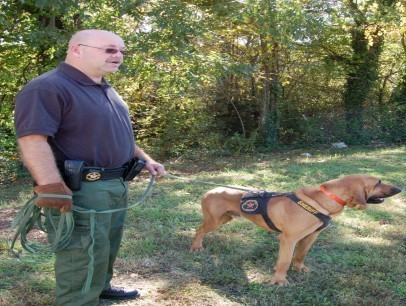Recently, Kim Franklin of the Georgia Chapter of the Alzheimer's Association spoke to about four dozen members of the Gwinnett County Police Department Citizen's Police Academy Alumni Association regarding how to deal with the state's 200,000 Alzheimer's disease victims.
Franklin, based in Atlanta, pointed out Alzheimer's disease is a progressive, irreversible disease that attacks the brain and results in impaired memory, thinking, and behavior. Common symptoms include memory loss, problems with reasoning and judgment, disorientation to time and place (long-term memory), difficulty in learning, loss of language skills, and decline in the ability to perform familiar tasks.
The symptoms often can resemble a person who is hard of hearing or even someone who is intoxicated, causing some officers and emergency responders to speak in a loud voice. That, Franklin said, is the wrong way to handle the situation. As the MedicAlert + Safe Return manager for the Georgia Chapter, she provides training to public safety personnel across the area in hopes of improving outcomes when responders deal with those suffering from Alzheimer's disease and related dementias.
But public safety personnel only have to deal with such patients in a home or institutional setting, such as a hospital or care facility, right? Wrong.
Six out of 10 people with Alzheimer's will wander. It is common for a person with dementia to wander and become lost, either on foot on in a vehicle; many do so repeatedly.
Franklin cited several examples, including an elderly woman with Alzheimer's who wandered out of her home where her husband was in the other room in April 2004. Her remains were found on Christmas Eve of that year, only 500 yards from her house.
Likewise, a man with dementia left his home by car at 9 a.m. to go to the store in his neighborhood. Seven hours later, he ran over a curb in a yard four counties away. And, an elderly woman with Alzheimer's got on a Greyhound bus in New York City to Atlanta with many stops in between. Seven days later, she was found by someone back in NYC.
For that reason, Franklin encourages people to register their loved one in Medic Alert + Safe Return as soon as he or she is diagnosed with dementia or Alzheimer's disease.
"It's always better to be enrolled in the MedicAlert + Alzheimer's Association Safe Return program and not need it, than not to be enrolled and have your relative or friend wander," Franklin said.
There is a small cost to register, but Franklin said financial assistance is available so lack of funds will not stop a Georgia resident from being registered. In fact, there is no cost if the person is referred by law enforcement or emergency personnel.
For enrollment, contact the Alzheimer's Association MedicAlert + Safe Return program at (888) 572-8566 or visit www.alz.org/safereturn.
Habersham County E-9-1-1 Director/Emergency Management Agency Director Lynn Smith is setting up a training session with Franklin for emergency responders there.
If a dementia or Alzheimer's patient goes missing, Franklin said a basic search of the home or place that person was seen last should be performed, but if unsuccessful the person should be reported as "endangered missing" to 9-1-1.
"They need to report them as soon as possible," Smith said. "The quicker that we can get somebody out there and get help to them, the quicker we'll be able to locate that person."
"Don't wait!" Smith said. "If you wait, that's time wasted that the person may get farther into the woods or away from the home. Time is of the essence."
"We usually tell families to search the general area for the missing person for 15 minutes, and if you do not immediately find the person call police to report the person missing," Franklin said. "In the state of Georgia, there is no wait period to report a person with Alzheimer's, dementia or any other cognitive impairment missing."
"We also encourage families to request that a Mattie's Call be implemented ASAP, which is done through the police," Franklin said. "We have more luck getting the person home quickly the sooner the Mattie's Call is done."
A Mattie's Call is an urgent bulletin from the Georgia Bureau of Investigation to the Georgia Association of Broadcasters. In addition, a Mattie's Call utilizes the A Child Is Missing (ACIM) telephone response system and the Georgia Lottery System to spread the word.
"The public is a great resource to help find these individuals," Franklin said.
Other available resources, such as tracking dogs, aircraft and search teams, may be utilized locally if the person left on foot from a known area.
For instance, in Habersham County, a sheriff's office bloodhound would be used to search for a missing dementia or Alzheimer's patient. That's because, officials say, a patrol dog such as a German Shepherd or Belgian Malinois, can frighten someone who already is disoriented or scared.
For both the public and emergency responders, knowing how to approach a potential Alzheimer's or dementia patient is very important.
"If you come into contact with a person with Alzheimer's disease, it is important to establish communication, create a soothing environment, and try to ask simple yes or no questions," Franklin said.
People are urged to follow these steps to interact with an Alzheimer's patient who appears lost or disoriented:
"Approach from the front, introduce yourself, and explain that you're there to help."Keep the individual away from crowds and noise, such as away from busy streets or stores, if possible.
"Establish one-on-one conversation and maintain eye contact.
"Speak slowly and calmly.
"Maintain a calm and supportive environment.
"Avoiding correcting or "reality checks."
"Ask "yes" or "no" questions.
"Keep instructions positive and succinct.
"Ask one question at a time. If necessary, repeat the question with the same exact wording.
"Substitute non-verbal for verbal communication.
"Avoid shouting. Loudness can convey anger.
The Georgia Chapter of the Alzheimer's Association offers a range of services designed to meet the needs of families caring for loved ones with Alzheimer's disease and related dementias. For more information, call (800) 272-3900 or visit www.alz.org/georgia.
Features of MedicAlert + Safe Return:
"One identification product serves two purposes: It provides emergency medical information and assists in the event of a wandering incident. All features of the Safe Return program remain intact.
"The member's personal health record lists medical conditions, medications and allergies and can be updated 24 hours a day through a private online account or by calling the toll-free number during business hours.
"The MedicAlert + Safe Return hotline activates the resources of law enforcement, medical professionals and local chapter staff to assist the member when an incident -- either wandering or medical emergency -- occurs.
More than 60 percent of people with Alzheimer's disease will wander and, if not found within the first 24 hours, will suffer serious injury or death.

Lynn Smith

Habersham County Sheriff

Kim Franklin, MedicAlert + Safe Return manager for the Alzheimer
http://accesswdun.com/article/2011/11/243826
